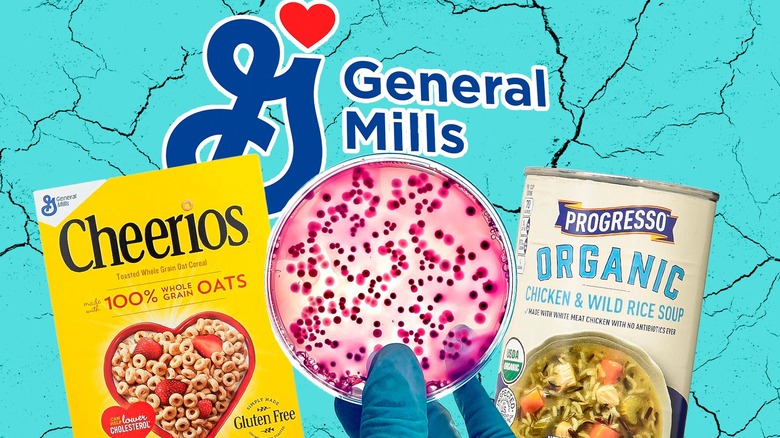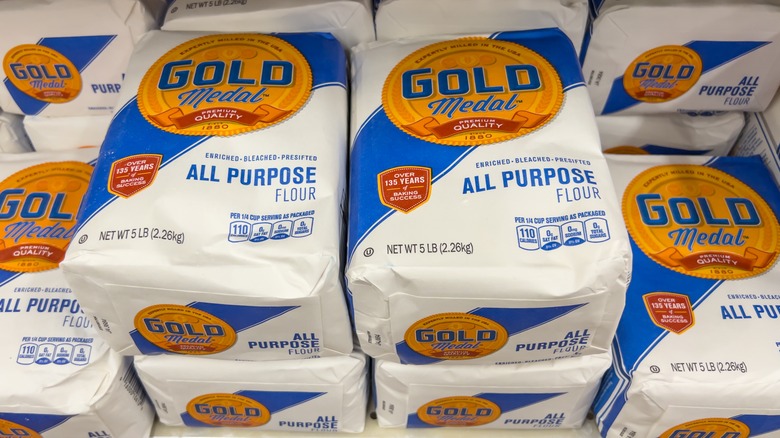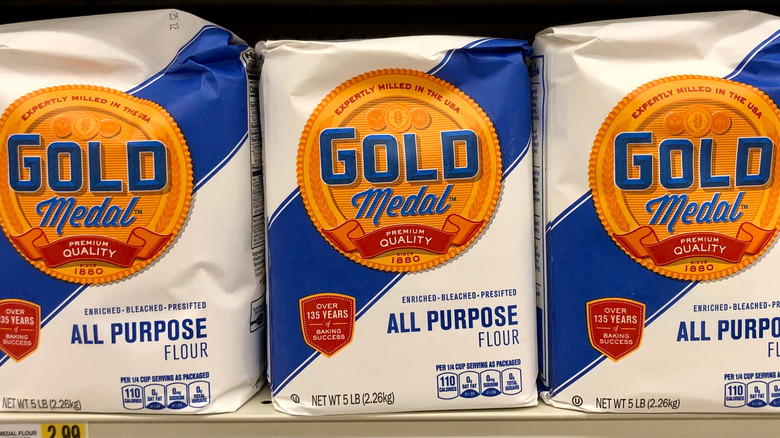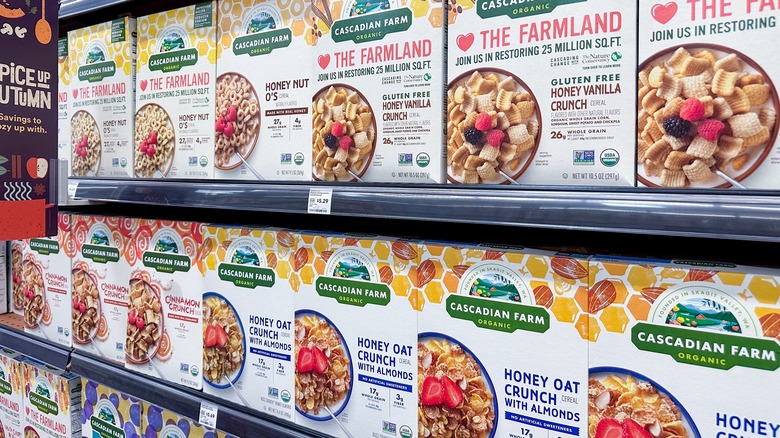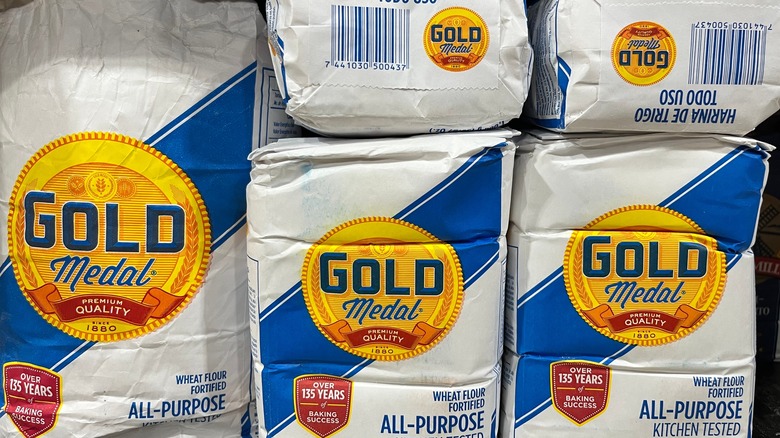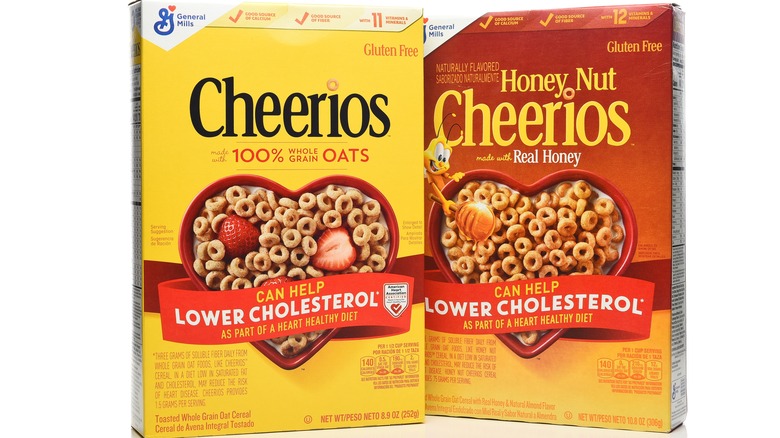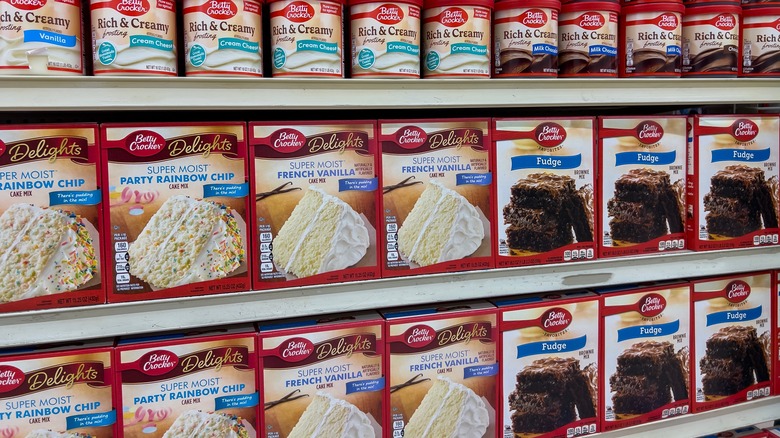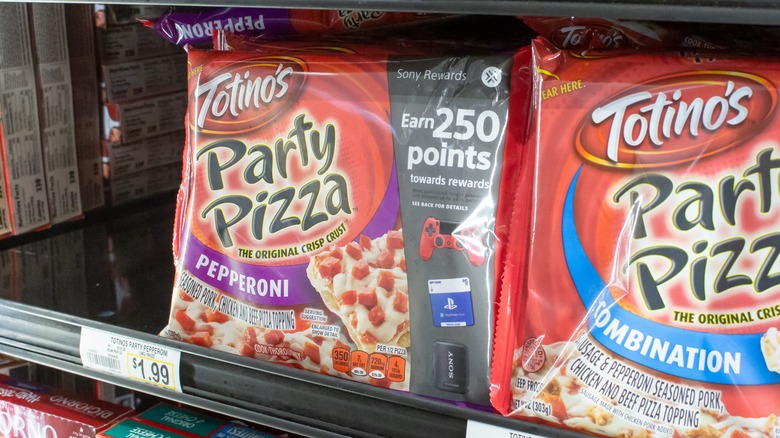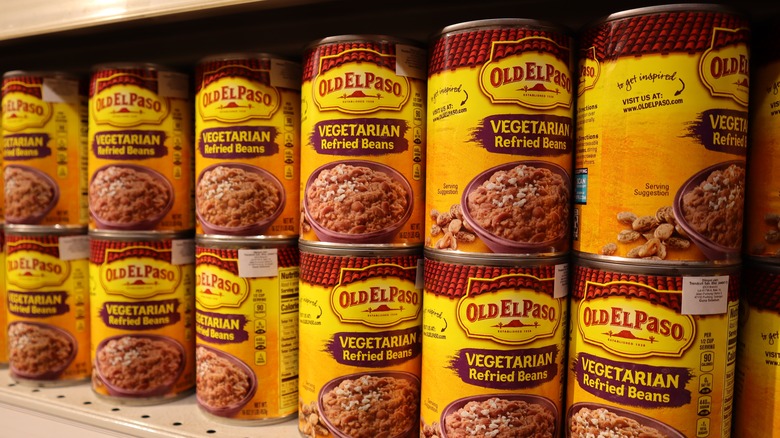The Biggest Recalls In General Mills History
With countless iconic brands under its corporate umbrella and a history that dates back to the 1800s, the General Mills corporation has initiated its fair share of product recalls over the years. Large-scale product recalls in the U.S. were virtually unheard of until around the 1970s, however, they have become more commonplace in recent times. While the history of General Mills product recalls isn't nearly as old as the company itself, it's safe to say that the corporation has been forced to recall significant quantities of its products nevertheless.
The following are the biggest recalls in the history of the General Mills company. Many of these recalls can be considered big simply because large quantities of products were affected — more than a million items in one instance — while others are included for the seriousness of risk they posed or the fact that popular products by iconic brands ended up implicated. The most common culprits for recalls are foodborne bacteria like salmonella and E. coli followed by undeclared allergens, but those aren't the only reasons for these major product recalls. Keep reading to learn more about the biggest recalls in General Mills history.
Risk of salmonella caused a Gold Medal Flour recall in 2023
Gold Medal Flour has a fascinating history, including providing the foundation for what would become the General Mills corporation with the merger of several flour mills in 1928. Fast forward to April 2023, when General Mills initiated a nationwide voluntary recall of four varieties of All Purpose Gold Medal Flour: unbleached 5-pound, unbleached 10-pound, bleached 2-pound, and bleached 5-pound bags were included. Those all added up to 2,018,149 pounds of recalled flour according to the Food Industry Counsel. The company stated those products labeled with one of two best-before dates — indicating they were produced in specific batches at a Kansas City, Missouri flour mill — were recalled because they potentially carried salmonella. The company warned consumers to avoid eating any products containing raw flour and described how high temperatures reached through everyday cooking techniques could kill salmonella bacteria from a contaminated bag.
Nevertheless, 14 people residing in 13 different states became ill with a strain of salmonella that the Centers for Disease Control and Prevention (CDC) determined had originated with bags of Gold Medal Flour. Salmonella infections are not altogether uncommon in the United States, with about 1.35 million cases reported per year, according to the CDC. Those result in an average of 420 deaths per year, so fatal infections are rare but not unheard of. While three of the people sickened by this Gold Medal Flour outbreak were hospitalized, the death toll from this contaminated product was zero.
Progresso Organic Chicken Noodle Soup recalled over mislabeled allergens in 2020
Progresso — which produces broths, beans, and other food products in addition to its iconic soups — is one particularly noteworthy brand owned by the General Mills corporation. In August 2020, General Mills announced a voluntary recall of 14-ounce cans of Progresso Organic Chicken Noodle Soup after it was discovered the label did not indicate the inclusion of soy and dairy. These are both relatively common allergens, so these sorts of recalls are intended to prevent someone with a relevant allergy from consuming the soup and having an allergic reaction. In fact, products with undeclared allergens on their labels are among the foods that are most likely to be recalled.
In this Progresso recall, only one batch of the chicken noodle soup lacked proper labeling, adding up to about 3,000 cans that had been distributed nationwide. Consumers could determine whether or not a given can was implicated in the recall by checking its best-before date, limited in this case to a single day. Customers were encouraged to dispose of any mislabeled cans, after which they were told to contact General Mills, presumably for some sort of refund.
Separate E. coli and salmonella scares caused two Gold Medal Flour recalls in 2019
Bags of Gold Medal Flour have been recalled by General Mills on more than one occasion. In fact, separate bacteria scares resulted in two different recalls of 5-pound bags of Gold Medal Unbleached All Purpose Flour in 2019. According to the Food Industry Council, the quantity of flour initially recalled totaled 639,560, whereas Food Industry Council data places the latter at 447,855 pounds.
The first recall came in January 2019. General Mills encouraged consumers to dispose of bags of this particular flour product with a best-before date of April 20, 2020, after discovering salmonella in a product sample. Then, in September of that same year, a batch of 5-pound Gold Medal Unbleached All Purpose Flour with a best-before date of September 6, 2020, was determined to potentially carry E. coli. The contamination was also discovered after the bacteria was found in a product sample. Like salmonella, E. coli bacteria can be killed by high temperatures used in everyday cooking techniques. Nevertheless, the risk that someone might consume a contaminated batch of raw flour — especially considering E. coli infections can be fatal — necessitated these dual recalls.
Undeclared almonds required a recall of a Cascadian Farm cereal in 2017
Cascadian Farm is a health-focused brand under the General Mills umbrella, producing exclusively organic food products including oat-based cereals and bars as well as frozen fruit and veggie products. In October 2017, General Mills announced a recall of certain boxes of Cascadian Farm Organic Cinnamon Raisin Granola Cereal for lacking text on the label declaring the presence of almonds — a common allergen.
Boxes of this cereal with two specific best-before dates were implicated, corresponding with two days of factory output. Just like in similar cases, anyone with a box of the recalled cereal could contact the General Mills company by phone for either a replacement or a refund. The volume of cereal recalled purportedly added up to more than 40,000 pounds of product in total, per Food Industry Council data. There were no public reports of illnesses resulting from undeclared almonds in the affected Cascadian Farm product, so the company presumably caught the error before anyone with a nut allergy inadvertently consumed the cereal.
E. coli necessitated a massive flour recall in 2016
Just a few years before the dual Gold Medal Flour recalls of 2019 and just less than 10 years prior to the Gold Medal Flour recall in 2023, General Mills instituted a massive recall of a wide range of flour products in response to an E. coli outbreak in 2016. That outbreak spanned months, surfacing in December of 2015 and continuing through September of the following year. In total, 63 people living in 24 different states fell ill.
General Mills initiated the first stage of what turned out to be a much larger recall in May 2016 after the CDC determined there was likely a link between the ongoing E. coli outbreak and flour manufactured at the corporation's Kansas City, Missouri factory. That first round involved 10 million pounds of flour, encompassing products by Gold Medal, Wondra, and Signature Kitchens, including self-rising and all-purpose varieties. Then in July, General Mills added some Betty Crocker cake mixes to the recall list as they contained Wondra flour. By the end of July and following a couple of additional stages, total volume reached a whopping 45 million pounds of flour recalled by General Mills.
Undeclared allergens in certain Cheerios products required a recall in 2015
What may well be the single highest-profile undeclared allergen incident in the company's history involves its storied Cheerios brand. Ultimately, General Mills recalled approximately 1.8 million boxes of Cheerios in October 2015. The offending Cheerios and Honey Nut Cheerios cereals were made with standard wheat flour, in packaging highlighting oat flour and claiming to be gluten free. Other variants of the cereal, including the likes of Apple Cinnamon Cheerios, were unaffected.
A spokesperson for General Mills explained at the time of the recall that a factory mishap resulted in the erroneous use of wheat flour in what was supposed to be a gluten-free production line at a facility in Lodi, California. Four days of Cheerios and thirteen days of Honey Nut Cheerios were produced before the error was corrected. Customers could identify those boxes by a range of best-before dates. While specifics are vague, General Mills claimed to have implemented a permanent solution in this incident's wake to prevent wheat flour from affecting future batches of Cheerios. Given the lack of Cheerios recalls since 2015, the system appears to be working.
Cascadian Farm green beans recalled after testing found listeria in 2015
As the Boar's Head deli meat listeria outbreak of 2024 made clear, this bacteria can pose a pretty serious risk to anyone who comes in contact with it — not just hospitalizations but nine deaths resulted from infections linked to Boar's Head meat. In August of 2015, General Mills tested a 10-ounce bag of Cascadian Farm Cut Green Beans and found that it carried listeria bacteria. As a result, the company recalled roughly 60,000 bags of Cascadian Farm green beans, indicated by two particular best-before dates.
In October of that same year, practically the same thing happened: General Mills tested a 16-ounce bag of Cascadian Farm green beans and discovered the presence of listeria bacteria. The company recalled approximately the same quantity of 60,000 bags, labeled with a single best-before date. The first recalled batch was produced in March of 2014 and the second in June of 2015, so it's entirely possible that the two cases were unrelated to one another. Fortunately, there were no public reports of any illnesses originating with a bag of Cascadian Farm green beans at the time of either recall.
Lack of labeling on food dyes triggers cake mix recall in 2012
In October of 2012, General Mills instituted a recall of SuperMoist Golden Vanilla Cake Mix manufactured by the historic Betty Crocker company. This recall was akin to undeclared allergen case, but rather than a lack of a proper allergen warning or the inclusion of an erroneous ingredient, the boxes of Betty Crocker cake mix in question simply failed to detail comprehensive lists of ingredients. Missing from their ingredients lists were four kinds of food coloring: Yellow 5, Yellow 6, Red 40 and Blue 1.
Exactly 6,223 cases, each containing 12 boxes of SuperMoist Golden Vanilla Cake Mix — adding up to a total of 74,676 boxes — ended up recalled, according to the FDA. For what it's worth, the inclusion of food dyes could be a difference maker for at least some customers. For instance, one reason Skittles are banned in other countries involves the inclusion of Yellow 5 and Yellow 6, both of which may induce hyperactivity in children. Some consider Red 40 a controversial ingredient as well. In fact, allergies to those coloring ingredients, while rare, are not unheard of.
Peanut butter that might have contained salmonella prompted recall in 2009
While General Mills has recalled products over their potential to carry salmonella as recently as 2023, the company had already done so as early as January 2009. At that time, the FDA determined that peanut butter produced by the Peanut Corporation of America carried salmonella, and two General Mills brands distributed products with that potentially tainted peanut butter. The affected products included Peanut Butter Cookie-flavored Lärabars and Peanut Butter Blisscrisp JamFrakas bars. Both products came packaged in various quantities, resulting in a recall of 15,000 cases in total of the two kinds of peanut butter bar according to FDA data.
Years later, in 2015, the CEO of the Peanut Corporation of America at that time landed a 28-year jail sentence for his culpability in the salmonella outbreak responsible for this General Mills recall. It wasn't the volume of the outbreak responsible for his criminal record but the fact that he appeared to be fully cognizant of the fact his company was shipping out tainted peanut butter. The General Mills recall, then, was a byproduct of this act of corporate misconduct.
Pepperoni possibly contaminated with E. coli led to a frozen pizza recall in 2007
Similarly to the 2009 peanut butter bar recall, in November 2007, General Mills recalled products packaged under two technically distinct brands due to the potential that an ingredient produced at a separate plant might carry bacteria. In this case, it was a pepperoni that may have been contaminated with E. coli on Totino's and Jeno's frozen pizzas.
A total of 5 million pizzas ended up implicated in this recall, all of which were made at a company facility in Wellston, Ohio. Alerting the General Mills corporation of the E. coli danger was the fact that nine out of 21 individuals exposed to E. coli bacteria around that time reported consuming either a Totino's or Jeno's pepperoni pizza beforehand. Those illnesses — while not necessarily high in number — spanned 10 separate states, with a majority in Tennessee. General Mills claimed that there was no evidence of E. coli not just in its factories but in any of its products. Customers who purchased a recalled pizza were encouraged to utilize a now-outdated system and mail its barcode to a P.O. box in order to receive a replacement.
Pop Secret popcorn recalled after multiple reports of burns in 2004
Food product safety standards seem to have improved pretty significantly over the course of the past couple decades or so. In other words, the earlier the product recall, the more likely the rationale behind it happens less frequently in the present day. In one such case, General Mills recalled a line of Pop Secret microwavable popcorn packaged under a Crispy Glazed nomenclature — available in caramel corn and kettle corn flavors — over injuries to consumers.
Specifically, multiple customers recounted receiving burns from the titular glaze component due to a difficult preparation method. This line of Pop Secret popcorn appears to be long since extinct, so it's not clear precisely what happened during that process to result in burns becoming a noteworthy issue. Nevertheless, enough customers complained that General Mills decided to recall 280,596 cases of popcorn in total.
Refried beans recalled over the potential for bacteria that causes botulism in 2002
In October 2002, General Mills instituted a recall for a line of refried beans under the popular Old El Paso brand over the possibility that cans might contain Clostridium botulinum, which is the bacteria responsible for botulism. The total number of cans of refried beans covered by this recall was relatively small — limited to a single batch of 4,080 — and it affected just the states of Illinois, Iowa, Indiana, Kentucky, and Missouri. That said, botulism can become fatal, so the risk was serious all the same.
Fortunately, no illnesses linked to contaminated Old El Paso beans were publicly reported. General Mills became aware of the issue after testing a can from the batch in question and determining that it was insufficiently heated during processing. The company had already corrected the issue responsible for that lack of heating by the time it issued the recall.
A Bug's Life branded flashlight toy with potential fire risk recalled in 1999
All the way back in August 1999, General Mills instituted a rare recall for something altogether inedible: a flashlight promoting the 1998 Pixar movie "A Bug's Life." Packaged with this flashlight were five lenses, each of which could project the shadow of a different character from "A Bug's Life" onto a chosen surface. As it turned out, those flashlights were prone to short circuiting and becoming hot to the touch, posing a burn risk — this danger was, in all likelihood, especially pronounced given that the flashlight was a toy marketed to children.
Customers could obtain one of these flashlights either by turning in barcodes from participating General Mills products or purchasing one directly through mail order. It was the latter method through which the majority of "A Bug's Life" flashlights were distributed, allowing the company to reach out to those customers directly. General Mills recalled 139,000 flashlights in total. Rather than provide direct replacements, the company seems to have determined that the toy was simply faulty, offering customers either cereal coupons or refunds depending on where their flashlight was purchased.
